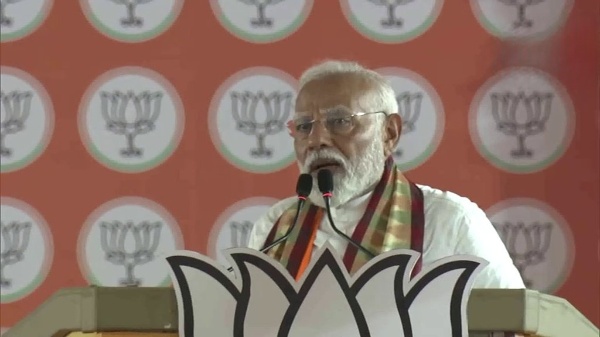In a spirited address to the public in Kendrapara, Odisha, Prime Minister Narendra Modi embarked on a rhetorical journey through India’s political history, drawing stark distinctions between what he portrayed as decades of corruption under Congress rule and the developmental achievements of his Bharatiya Janata Party (BJP) government.
Addressing a diverse audience gathered for the public meeting, Modi remarked, “The country has seen decades of the Congress rule as well a decade of the BJP rule. The decades under Congress rule saw nothing but big scams…and the last ten years under the Modi government were all about development.”
Modi’s comments underscored a recurring motif in BJP’s electoral rhetoric, framing the party as a catalyst for progress and good governance, while framing the Congress era as synonymous with systemic corruption and bureaucratic inertia. By juxtaposing the alleged malfeasance of previous administrations with his government’s purported accomplishments, Modi aimed to reinforce the narrative of BJP’s transformative leadership and rally support ahead of looming electoral contests.
Throughout his address, Modi highlighted a slew of initiatives and policy interventions initiated by his government, ranging from infrastructure projects to social welfare programs, as testament to his commitment to inclusive growth and prosperity. Flagship schemes such as ‘Make in India’, ‘Swachh Bharat Abhiyan’, and ‘Ayushman Bharat’ were touted as emblematic of the BJP’s vision for a vibrant and resurgent India.
However, Modi’s assertions were met with skepticism from critics, who contend that the reality of governance under the BJP is more nuanced than the binary narrative espoused in his speech. Opposition parties and political analysts have pointed to persistent challenges such as economic inequality, environmental degradation, and concerns regarding democratic norms, challenging the rosy depiction of BJP’s tenure in power.
Moreover, Modi’s address unfolded against the backdrop of a nation grappling with the reverberations of the COVID-19 pandemic, which laid bare the vulnerabilities of India’s socio-economic fabric. As the nation confronts a plethora of complex challenges, Modi’s rhetoric serves as a catalyst for introspection, stimulating conversations about the imperatives of governance and the trajectory of India’s democratic experiment.
In conclusion, Prime Minister Narendra Modi’s address in Kendrapara, Odisha, provided a platform for reflection on the contrasting narratives of governance in India, from the alleged scandals of the Congress era to the developmental agenda championed by the BJP. As the nation navigates the contours of its democratic journey, the discourse surrounding governance, accountability, and inclusive growth assumes heightened significance.
Modi’s impassioned rhetoric underscores the enduring quest for progress and prosperity, as citizens grapple with competing visions of India’s future. Whether Modi’s assertions resonate with the electorate remains to be seen, but his speech in Kendrapara serves as a poignant reminder of the enduring contestations that animate India’s political landscape.



